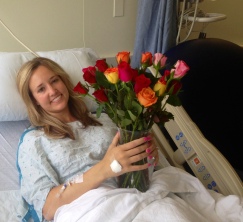The holiday season is upon us and with that comes family gatherings, social outings, and more food than anyone can handle. As someone who was diagnosed with Crohn’s disease more than 14 years ago, the holidays can still be complicated and stressful at times.

Christmas 2013 with my family
If you’re reading this—and you have a family member or a friend with IBD, you’re in the right place. Chances are you may struggle with how to be supportive, knowing what to say, and how to navigate IBD. I’m here to help so that this truly can be the best time of the year, for everyone involved.
Here are my top 10 tips for making that possible:
- Start the conversation. Stop making IBD the elephant in the room. It can be more hurtful if you only see family or friends a couple times a year and if no one asks how you are feeling. Three words—is all it takes— “How’s your Crohn’s?” Ask questions and genuinely listen to our answers. Your empathy means more than you know. This puts the onus on the person with IBD, and allows us to disclose what we’re comfortable sharing, while knowing that you care. When people don’t ask, it seems as if they don’t care. I find this to be especially true as a patient advocate and blogger. So much of my presence and identity is talking about my life with Crohn’s, that when people don’t ask, it hurts more now than it used to. With the growing online social media discussion, I’m sure many people in our community can relate to this.
- Leave the neighborhood watch party for criminals in the streets. Chances are Aunt Joan came across a diet “cure” for Crohn’s while perusing through Facebook last month. Insert eye roll. Don’t question the food we put on our plates or ask if that’s going to “hurt our stomachs”.
 We know our bodies, we know our triggers, and we are the ones who are ultimately going to have to pay if symptoms arise. Comments like “Oh, I didn’t think you could eat that?” or “Isn’t that going to land you in the bathroom?” are completely unnecessary. Focus on passing that side dish of mashed potatoes rather than giving us the side eye at the dinner table.
We know our bodies, we know our triggers, and we are the ones who are ultimately going to have to pay if symptoms arise. Comments like “Oh, I didn’t think you could eat that?” or “Isn’t that going to land you in the bathroom?” are completely unnecessary. Focus on passing that side dish of mashed potatoes rather than giving us the side eye at the dinner table.
- Be flexible. The unpredictability of IBD—whether it’s feeling too fatigued to shower, lying in pain on the couch or holed up in a bathroom when you’re supposed to be getting ready or making a side dish, can cause us to be late for social gatherings. If a family member is tardy to the party or needs to leave earlier than expected, please don’t give them grief. Chances are they had to muster up a great deal of strength to get out of bed, get dressed, and put on their happy face, even if they are struggling on the inside. Practice grace and patience and remember how easy it is for us to mask pain with a smile.
- Don’t be offended if we bring our own food or don’t eat much. Oftentimes if we’re symptomatic or in the middle of a flare we are nauseous and eating feels too risky. It’s nothing against the way you make the family favorites. Trust we would eat everything if we could.
 Bringing “safe” foods or eating ahead of time at home provides comfort and allows us to enjoy more of the party. Please don’t take offense if we eat very little, or nothing at all.
Bringing “safe” foods or eating ahead of time at home provides comfort and allows us to enjoy more of the party. Please don’t take offense if we eat very little, or nothing at all.
- Please don’t make us feel like a spectacle. Chances are while at a social gathering, we’re going to need to break away to use the bathroom. If we need to go upstairs to use your bathroom, please don’t be offended or draw attention to us when we leave the table or return. We’re not trying to be rude; we’re already embarrassed and don’t want to deal with the anxiety of hogging the bathroom or smelling up the house as people socialize.
- We have doctors. Thanks to social media and Google, many seem to think they have the background of a MD. Please don’t try and teach us about a way we can “heal with food” that worked for your neighbor. Please don’t downplay or compare IBD to a stomach bug your toddler had.
 Please trust we know the side effects of the medications we are on; we know the risks of the surgery we may have to get; we know it all. Please don’t tell us to start taking a supplement you found online. Yes, we’ve heard of: CBD oil, turmeric, probiotics, the list goes on. Please don’t question the safety of our biologic. Our disease is our reality. Unless you live it, it’s not yours.
Please trust we know the side effects of the medications we are on; we know the risks of the surgery we may have to get; we know it all. Please don’t tell us to start taking a supplement you found online. Yes, we’ve heard of: CBD oil, turmeric, probiotics, the list goes on. Please don’t question the safety of our biologic. Our disease is our reality. Unless you live it, it’s not yours.
- While IBD is invisible, oftentimes it’s not. If a loved one is on steroids, trust me they are incredibly self-conscious about their appearance. The temporary chipmunk cheeks (are not cute), the acne that makes you feel like a teenager (is nothing to kid about), the sudden influx in weight (is nothing to comment on). The same goes for someone who looks like they’ve dropped a lot of weight. When you have IBD, weight fluctuations happen all the time. It’s not a good thing. It’s because we’re malabsorbing nutrients or in the thick of a flare. If you notice these outward differences in us, please keep the thoughts to yourself unless you know we are purposefully trying to lose or gain weight. Don’t pressure us to be in photos if we seem hesitant. Know that we are aware of the changes and struggle with them daily.
- Don’t push the booze.
 Just as with food, everyone with IBD responds differently to alcohol. We understand a glass of wine here or a beer there at a celebration may not seem like a big deal, but one drink can be enough to cause us extreme abdominal pain. Feel free to ask us, but if we decline the offer please don’t pester us, ask us if we’re pregnant, or try and make us succumb to peer pressure. We’d much rather be sober and present at the party without pain.
Just as with food, everyone with IBD responds differently to alcohol. We understand a glass of wine here or a beer there at a celebration may not seem like a big deal, but one drink can be enough to cause us extreme abdominal pain. Feel free to ask us, but if we decline the offer please don’t pester us, ask us if we’re pregnant, or try and make us succumb to peer pressure. We’d much rather be sober and present at the party without pain.
- Use us as a resource. Have a family member, friend, or co-worker of yours recently diagnosed with IBD? Let us know! Use us as a sounding board. I always love having the opportunity to use my patient journey and experience to bring hope and inspiration to others. Connect us with people in your life who we can support and help. The IBD family is incredibly welcoming and uplifting. By sharing this mutual connection, you can possibly change someone’s patient journey for the better.
- You play an integral role in our overall well-being. You bring us normalcy. You have the ability to distract us from our isolating illness.

With my (now) husband, New Years Day 2014. I was very sick at this family party. You would never know it by looking at this photo.
If someone close to you has IBD and they aren’t opening up or wanting to talk about it, don’t push them. We all handle the disease differently, and chances are in time, when the moments right, they will take down their walls. In the meantime, make it known you are present and there to offer support and encouragement every step of the way—and leave it at that. The simple act of knowing who we can count on and trust makes all the difference. Thank you for walking alongside us on this unpredictable and challenging journey and for seeing us as so much more than our disease. For that we are eternally thankful.



 She is involved in research and clinical care, and she created the IBD Anti-Inflammatory Diet which is being investigated through the MELODY Trial. Barbara explains how through the MELODY Trial, the team is aiming to intervene in the transmission of a pro-inflammatory microbiome from women with Crohn’s to their babies.
She is involved in research and clinical care, and she created the IBD Anti-Inflammatory Diet which is being investigated through the MELODY Trial. Barbara explains how through the MELODY Trial, the team is aiming to intervene in the transmission of a pro-inflammatory microbiome from women with Crohn’s to their babies.






 If you’ve never attended a Crohn’s and Colitis Foundation event for your local chapter—whether it’s a patient symposium, an education event, a walk, or a Gala, I highly recommend you check them out. While it’s great to connect on social media or over the phone, nothing compares to physically being in the same room with people who are passionate about the same cause, who understand your reality, and are driven towards the same mission as you.
If you’ve never attended a Crohn’s and Colitis Foundation event for your local chapter—whether it’s a patient symposium, an education event, a walk, or a Gala, I highly recommend you check them out. While it’s great to connect on social media or over the phone, nothing compares to physically being in the same room with people who are passionate about the same cause, who understand your reality, and are driven towards the same mission as you.
 For many of us in the IBD community, we deal with what is called Iron Deficient Anemia or IDA. With Crohn’s and ulcerative colitis, long-term irritation and inflammation in our intestines can interfere with our body’s ability to use and absorb iron properly. IDA is considered an extraintestinal manifestation of IBD.
For many of us in the IBD community, we deal with what is called Iron Deficient Anemia or IDA. With Crohn’s and ulcerative colitis, long-term irritation and inflammation in our intestines can interfere with our body’s ability to use and absorb iron properly. IDA is considered an extraintestinal manifestation of IBD. I provided the patient perspective. It was a great opportunity, but also taught me a lot about the prevalence of IDA with the IBD community, and the importance about being proactive and getting yourself the boost you need so you can feel your best each day. As a mom of two little ones, my anemia along with my Crohn’s can be a heavy burden to bear. That’s why I do my best to stay on top of managing my illness and taking all the supplements necessary to try and combat my malabsorption problems. I hope this article inspires you to do the same and realize you are never alone in your struggles.
I provided the patient perspective. It was a great opportunity, but also taught me a lot about the prevalence of IDA with the IBD community, and the importance about being proactive and getting yourself the boost you need so you can feel your best each day. As a mom of two little ones, my anemia along with my Crohn’s can be a heavy burden to bear. That’s why I do my best to stay on top of managing my illness and taking all the supplements necessary to try and combat my malabsorption problems. I hope this article inspires you to do the same and realize you are never alone in your struggles.
 When seven-year-old Penny was diagnosed with Crohn’s in January 2017, her grandmother, Mary, started knitting her a purple blanket. She chose the color purple because it’s not only Penny’s favorite color, but also the color that represents Inflammatory Bowel Disease (IBD).
When seven-year-old Penny was diagnosed with Crohn’s in January 2017, her grandmother, Mary, started knitting her a purple blanket. She chose the color purple because it’s not only Penny’s favorite color, but also the color that represents Inflammatory Bowel Disease (IBD).


 At the same time, Mary says she’s impressed by Penny and how she is taking all the baggage that comes with Crohn’s in stride at such a young age: the daily medications, the infusions, the lifestyle changes.
At the same time, Mary says she’s impressed by Penny and how she is taking all the baggage that comes with Crohn’s in stride at such a young age: the daily medications, the infusions, the lifestyle changes.